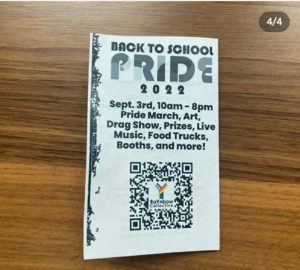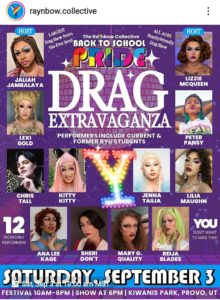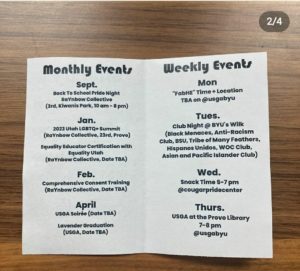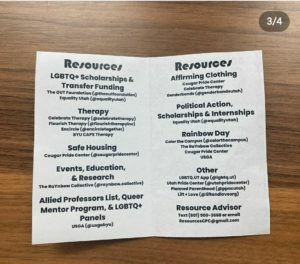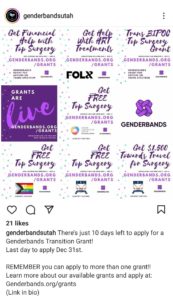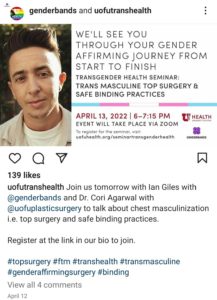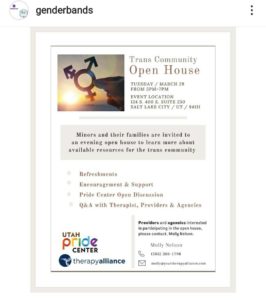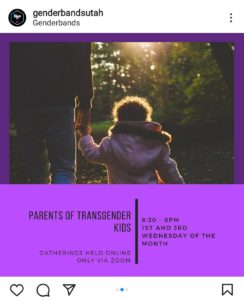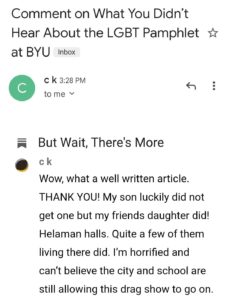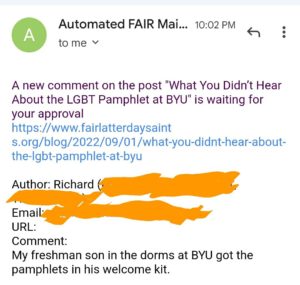BYU unquestionably made the right choice to remove an LGBT “resource pamphlet” from freshman welcome bags, but the public doesn’t understand why. Reporting has sympathetically portrayed student activists and their purported good motives, but failed to detail their disturbing and harmful recommendations.
The latest tempest in the social media teapot features yet another clash between the Church of Jesus Christ of Latter-day Saints and the antagonism of the growing activist class. BYU administration prevented several groups from giving an LGBT “resource pamphlet” to all incoming Brigham Young University freshmen, and the groups are condemning it for censorship, breach of contract, and hard-heartedness toward the needs of its vulnerable students.
But are you aware of what’s actually in the pamphlet – and why the school administration was unquestionably correct to intervene?
Probably not. The Salt Lake Tribune framed the decision almost entirely as a failure to love. They cite no fewer than six different outraged activists certain this is what had happened – e.g., “No student should feel rejected by their university because of their identity…You love the school so much and they just don’t love you back…They don’t want us there and don’t care about our lives.”
That’s the main take-away from Courtney Tanner’s article: Why does BYU keep having to be so mean? Tanner also cited without question the organizer’s insistence that the pamphlet “didn’t include anything that went against the school’s policies,” (which is extremely false, as we’ll soon see), while amplifying her plaintive appeal, “I just wanted students to be safe and taken care of” (which is highly debatable, as we’ll soon see).
The Tribune did include photos of every page of the pamphlet, though without exploring how its contents might have given BYU legitimate grounds to object to it. The Deseret News coverage of the controversy didn’t show or link to a picture of the pamphlet, or provide much detail about its contents. It instead focused on the advocacy groups’ complaint, links to each of their websites, sympathetic quotes from their leaders, and lawyerly explanations from BYU administrators expressing concern about implied endorsement of “non-official resources.” Just some muddle about official vs. non-official, nothing of substance or real concern…
Based on the reporting, it’s unclear but possible that some students–we don’t know how many– may have received a pamphlet before the administration intervened. According to Deseret News, “Residence Life and New Student Orientation were not involved in preparing these bags and were not aware of the contents until after they had been distributed to some on-campus resident halls.” So two or ten or hundreds of students may have received the pamphlet; we don’t know.
Given that I oppose providing the booklet to BYU students, why draw further attention to it here? Because parents deserve to know what’s being pushed on their children by rogue activists at BYU, because it could profoundly harm their faith, and their mental and physical health. If we’re not given key information, such as the actual contents of the pamphlet, it’s difficult to make necessary judgments and take crucial precautions.
In the media’s coverage, activists simply want to help students in need, but lawyerly administrators are interfering in their earnest efforts to do good. The Deseret News quotes their dismay that “[i]t took hundreds of hours and over 50 volunteers to provide this packet and other resources. This decision is disappointing and disheartening.” Readers are meant to feel the pain of thwarted hard work and noble intentions, and not to wonder if there’s more going on.
But anyone curious enough to spend thirty seconds searching for more depth will find genuinely shocking details. It’s distressing that parents aren’t getting that detail from the news.
The back page of this pamphlet is an invitation to “a Sept. 3 Back to School Pride Night at Kiwanis Park organized by the RaYnbow collective.” That sounds fun, and defensibly supportive of LGBT students without violating church or school policy. But a peep at the actual pamphlet provides a startling detail–this is not just a humdrum invitation to a rainbow-themed party.
Amid the art, prizes, live music, food trucks, and booths, I suppose one might honestly overlook the vivid centerpiece: a drag show. Every incoming BYU student was nearly invited (or, if the reporting is correct, some were in fact invited before the administration intervened) to a drag show? A ghastly caricature of womanhood, a reduction of the sacred to a profane mockery, a sexualized depersonalization of half of Heavenly Father’s children–some BYU students were hosting this and thought it proper to invite the entire student body?
Yes, and this isn’t even the first time they’ve done it. Last fall “BYU Pride” hosted a “Family-Friendly Drag Show” in Provo. They partnered with the Out Foundation and received social media support, if not formal involvement, from the RaYnbow Collective. Shortly afterward, “BYU Pride” changed its name to the “Cougar Pride Center,” apparently at the request of BYU, to avoid the implication it’s officially affiliated with the school. But there’s no indication the student activists who hosted last year’s drag show suffered any discipline or consequences for it.
(These same organizations–the Cougar Pride Center, the Out Foundation, and the RaYnbow Collective– are three of the activist groups that produced this year’s pamphlet.)
The photos and video I saw from last year’s drag show were fairly tame compared to other drag examples I’ve seen, though “tame” is a ridiculous term to apply to what is, again, a devilish profanity against womanhood. But this year’s drag show, as publicly advertised by the RaYnbow Collective on Instagram, and set for this very weekend, looks to be rather more…flamboyant:
Some of the troubled souls who organized this event and designed this flier are current BYU students. Their worldview is so twisted that they think that puns on “genitalia” and “anal leakage” are “affirming” and edifying for their fellow students. I looked up some of these drag performers on social media, a pastime which I strenuously do NOT recommend, and they are not “family friendly,” to put it lightly. Photos and videos of pornographic dances and outfits abound. One proclaims “Mormonism is &$^%#@,” and another poses provocatively in front of a temple. We’re a very long way from anything virtuous, lovely, of good report, or praiseworthy.
Activists are setting a trap for those trying to both be true to their faith and to sincerely love their LGBT friends and family. If “support” for the LGBT community requires normalizing drag shows, which requires abandonment of basic virtue and sanity beyond what anyone of good faith could reasonably expect, then LGBT young adults are emotionally pressured into believing their loved ones will never “support” them. This alienates LGBT students from their families and church leaders, poisons their faith in the church, and emotionally bonds them to the activists.
The more pressing tuition issue concerns tithing. It shouldn’t have to be said, but: no student who promotes and attends, let alone organizes, a drag show should continue to enjoy tithing-subsidized attendance at a church institution. How could organizers even suppose they’d be able to place an invitation to a drag show into the gift bags distributed to the entire freshman class (and, rumor has it, distribute additional invitations in the dorms)? Because they’ve been systematically pushing their limits and have so far experienced lots of success and no consequences. And now they’re escalating. The student newspaper at BYU, apparently lacking in necessary good sense and oversight, reportedly paid the activists $2000 to cover the costs of printing and distributing the pamphlet.
The drag show is just one item in the booklet. What other “resources” does it highlight?
The Deseret News reports, the pamphlet includes “information about campus resources for LGBT students, such as counseling.” However, there are only a select few BYU resources included on the pamphlet that are official: the University’s Counseling and Psychological Services for therapy, and “Club Night” at the Wilkinson Center on Tuesdays (although the latter event specifically includes the “Black Menaces” along with official ethnic organizations, so it’s not exactly a great example of a “campus resource”).
All of the remaining twenty-seven resources (some are listed twice) are “off-campus resources not approved by the University.” For instance? The USGA (Understanding Sexuality, Gender, and Allyship) gets a mention, and again the pamphlet sponsors–the RaYnbow Collective, the Out Foundation, and the Cougar Pride Center. But without a picture of or link to the pamphlet, readers are left ignorant of some other more recognizable and disturbing “resources.”
Like Planned Parenthood. Category: “Other.”
LGBT students at BYU are not traditionally known for being in need of Planned Parenthood’s most famous services, for reasons both biological and doctrinal. But it’s a new era of progress, and Planned Parenthood has found a new strategy for amassing impressive profits: prescribing cross-sex hormones to transgender-identifying young adults. Taking cross-sex hormones to attempt to change one’s gender is in total opposition to church teachings and therefore totally inappropriate to promote at BYU.
It’s hardly believable, but an unknown number of BYU freshmen may have just been referred to Planned Parenthood for cross-sex hormones and medical gender “transition.” These are 18-year-olds, arriving at BYU to begin a church-sponsored education, away from their parents for the first time, perhaps struggling from the mental and emotional scars of pandemic isolation and social media overload, perhaps struggling with autism or low self-esteem or bullying or discomfort with their bodies…and a pamphlet in an official welcome bag suggested they consult Planned Parenthood. Parents may not know Planned Parenthood is now as famous for hormone prescriptions as it is for abortions. But your kids probably know.
It’s also in total opposition to church teachings to “socially transition” one’s gender via changes to dress, grooming, name or pronouns, yet the pamphlet boldly offers help in obtaining “affirming clothing,” meaning clothes to appear as the opposite gender or as “non-binary,” neither male nor female. The last resource listed there, Genderbands, was unfamiliar to me, so with the enterprising spirit so sadly lacking among paid journalists, I looked them up on Instagram.
It turns out “Genderbands” provides free chest binders to transgender-identifying young women who wish to constrict their breasts to appear more masculine, a common practice among those “socially transitioning” their gender. Chest binding is so risky that it requires medical sites to provide guides for doing it safely; as the Cleveland Clinic points out, there’s not much good data in its favor and some evidence it causes infections, scarring, pain, respiratory difficulty, musculoskeletal issues including rib fracture, and neurological issues. That young women are being enticed, pressured, and indoctrinated into harmful practices like chest binding is a horrifying indictment of our culture; it is utterly imperative that BYU remain an oasis from it.
But binders are only a small part of Genderbands’ mission. Their main goal is to provide financial aid for those wishing to medically or surgically “transition” their gender, which are both dangerous and irreversible. One can apply for one (or more) of many grants:
“Top surgery” means permanently removing a woman’s healthy breasts because she wishes to “transition” to male, or to implant false breasts on a male chest to help him “transition” to female. Once again, both are totally against church teachings and totally inappropriate to promote at BYU. “Bottom surgery” also exists–fair warning that the details thereof are horrifying–but presumably isn’t funded by Genderbands because it’s far more expensive.
“HRT” means prescribing female hormones like estrogen to males, or male hormones like testosterone to females, who wish to “transition” to the opposite sex or non-binary. It is meant to change the body’s appearance and composition, but also risks causing permanent health problems, sexual dysfunction, infertility, and the need for lifelong medical intervention.
It’s horrifying that a “resource” nearly provided to all BYU freshmen (and possibly distributed to at least some of them) encourages such dangerous, spiritually treacherous, and family-destroying procedures.
The Genderbands grants are sponsored by surgery clinics, who no doubt calculate they’ll gain more paying customers through this charitable exposure. And if a confused and distressed BYU student is interested in surgery, but doesn’t know enough about it yet? Genderbands touts seminars with surgeons to talk you into it:
Genderbands doesn’t solely focus on college students, who are still young but are at least adults; they also promote events for minors:
They also do outreach to parents of gender-confused children, apparently including kids like this one, who appears to be perhaps five years old:
I haven’t joined a Genderbands Zoom session, so I’m not certain how five-year-olds might fit in with their mission, stated on their homepage, to “[help] make transition a reality.” But I think it’s fair to guess they encourage social transition for young children, a powerful psychological intervention that, instead of letting a child develop an accurate understanding of himself and come to terms with his biology, instead solidifies an artificial–perhaps even accidental–transgender identity and leads to dangerous medical interventions.
To reiterate, a group of BYU activists came extremely close to introducing the entire freshman class to extreme transgender activism. This network was poised to infect as many students as they could with an ideology that leads them directly away from Christ and His church’s teachings, their covenants, their grounding in a true understanding of biology and family relationships, and their parents’ influence. The activists came so excruciatingly close despite recent egregious behavior (last year’s drag show) and ample evidence they couldn’t possibly be trusted to provide “resources” to new students.
Perhaps we once lived in a world where one could assume good faith and sound judgment from such groups. We are no longer in that world; we’re not even in that galaxy, universe, or space-time continuum. These groups are not sincerely seeking tolerance and love, despite all their emotional statements to journalists. They are working to fill your childrens’ minds with warped sexuality, tragically distorted identity, and emotional and ideological commitments that are spiritually fatal.
Hopefully, you’ve already inoculated your children against this. It would be foolish to assume sending a child to BYU means she’ll never have to grapple with these issues or face insidious persuasion, cloaked in false spirituality, from activists.
But it’s still imperative to honestly acknowledge who these activists are and what they actually believe. A BYU Freshman reading news coverage of this incident would probably conclude the only thing at stake here was the selfless efforts of big-hearted “allies” who just want to care for marginalized students. He might easily come away feeling sorry for the activists and irritated at the book-banning administrators. He might conclude there’s no incongruence between what the activists teach and the gospel. This makes them more susceptible to the motte-and-bailey arguments they often employ. He might decide to go to the Pride event and other events when he wouldn’t have otherwise, just to stick it to the supposedly tyrannous administration.
And if he reads other Deseret News articles, he’ll be subtly persuaded to accept the paradigm that “medical care for transgender children” requires “gender-affirming care” in the form of puberty blockers and cross-sex hormones, an infuriatingly tendentious and inappropriate framing from a church-owned publication. When the reckoning over dangerous endocrine treatment for transgender-identifying minors comes–and it assuredly will, because the evidence in its favor is astonishingly weak-to-nonexistent–the Deseret News should not be among the vast majority of institutions that have to make futile apologies to the individuals and families whose lives were ruined by a false narrative. But if they continue on their current track, they will be.
It’s completely horrifying that the groups who produced the “resource” continue to have some access to BYU administration and presence on campus. BYU students should be plainly warned of the dangers of these groups. This is a serious, deeply disturbing incident. The activists behind it should never again be treated as trustworthy or benign. Their leaders should be expelled and prevented from ever distributing materials on campus again.
I don’t want to spend my time wading through this sewer. I wish I could go back to the time when I didn’t know Jenna Tailia was about to perform in drag for an audience composed largely of BYU students. My mental and spiritual well-being were not improved by the hours it took to debunk the false claim that transgender-identifying kids and teenagers must be allowed to take puberty blockers and cross-sex hormones or else they will kill themselves. I do it because families I love are being bullied into “gender affirmation” and need accurate information to be able to actually help their children–and they can’t find accurate information. I write articles on these strange, sad topics because families need essential details from sources that have the means and opportunity to provide them–but don’t. They’re not even merely withholding accurate information, but actively misleading people with false narratives featuring oppressive administrators, virtuous activists, uncontroversial medical research, villainous legislators, and other fictional characters. I hope to help people see through the dark mist of superficial euphemisms and discern the truth, so they can prepare and arm their children against these challenges.
The fog of euphemisms like “resources,” “allyship,” “affirmation,” and “pride” is a serious threat to your children’s faith, and your own. No one can honestly portray these activist groups as supportive of faith, the church, the mission of BYU, or even basic decency–but journalists try it anyway, including at a church-owned publication. This advocacy defies science, scripture, and sound psychology. The Rainbow Jesus who commands only “love” and never chastity, who celebrates and affirms and never judges anyone except those bigoted haters, is a false idol as powerless yet attractively dangerous as any Baal.
Isaiah prophesied of “scornful men” who say “when the overflowing scourge shall pass through, it shall not come unto us: for we have made lies our refuge, and under falsehood have we hid ourselves.” I don’t know the precise identity of the scriptural “overflowing scourge,” but the anti-family cult of pride and drag shows and gender “transition” sure feels like one. It has overflowed its origins in obscure academia, spilling over through your child’s smartphone and your Netflix account and all of social media and even into the welcome bags for new BYU students. It’s brash, confident, and strong, with our entire culture bolstering its appeals to love and expressive individualism. It has colonized minds, perhaps your own and your children’s, in ways you might not even recognize, let alone resist.
There is no refuge in lies. There is no shelter under falsehoods and euphemisms. There is no salvation in a false gospel of Pride. The scourge can spiritually destroy anyone who pretends to have found safety by downplaying the danger. The only safe place to stand is in holy places, in temple covenants of chastity and loyal defense of the truth. Be not moved.
UPDATE: There’s some evidence a significant number of BYU freshmen did receive the pamphlets as they moved into the dorms last week, before the administration was able to intervene.
Note: This article was originally published on cassandrahedelius.substack.com.
The post What You Didn’t Hear About the LGBT Pamphlet at BYU appeared first on FAIR.
Continue reading at the original source →




